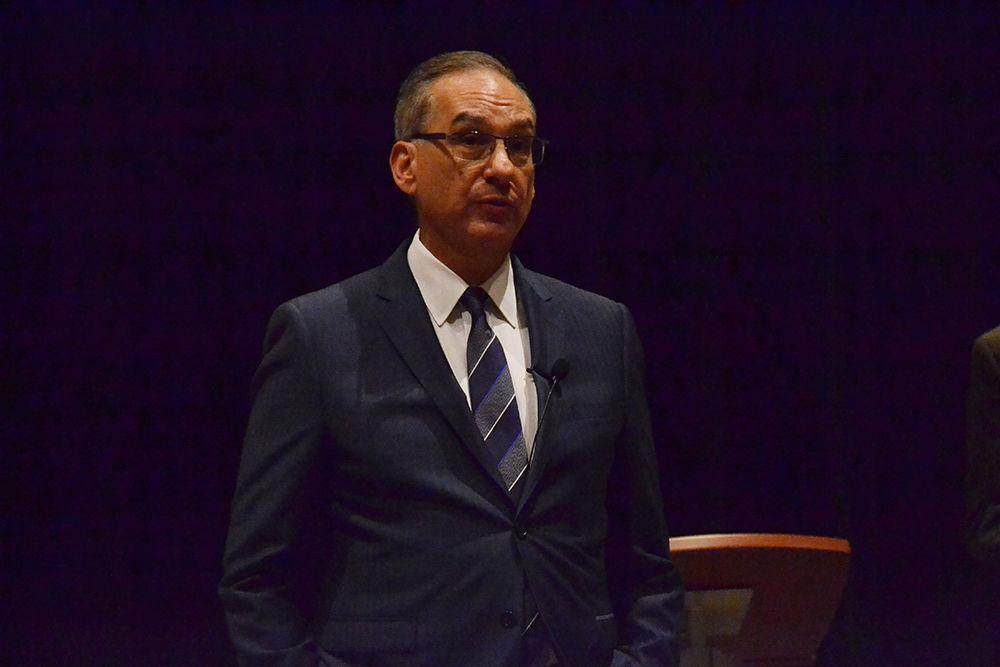 " />
" />
Sindy Huang
Randy E. Barnett talks about his latest book, “Our Republican Constitution: Securing the Liberty and Sovereignty of We the People," in Nelson Hall on Monday. Barnett's talk discussed the Democratic and Republican views of the constitution, referring to whether the Constitution is supposed to protect the rights of the many or the rights of few.
Monday night, Randy Barnett, a constitutional scholar and law professor at Georgetown University Law Center, spoke in Nelson Hall about his views on constitutional originalism, governmental republicanism and Judge Neil Gorsuch’s nomination to the Supreme Court. The lecture was part of the annual John W. Pope Lecture Series, which “encourages dialogue on topics of political and economic interest.”
Barnett, who was originally scheduled to speak the previous week but postponed to attend Gorsuch’s nomination hearings, began his lecture by talking about ideas from his book, “Our Republican Constitution.” The book is a historical argument for a republican system of government, as opposed to a democratic one, which Barnett asserts would lead to ruling by “the tyranny of the majority.”
According to Barnett, the death of the late Supreme Court Justice Antonin Scalia combined with Senate Republicans’ refusal to consent to any nominee for the Supreme Court until after the November elections (a move he asserts is standard procedure when a president is in the last year of their term while campaigning is ongoing) made the matter of the future of the Supreme Court a central matter to voters.
“[It] raised the stakes on an issue that should always be on the forefront of a presidential campaign but usually is not: the future of the Supreme Court, and of our Constitution,” Barnett said.
Barnett asserted that President Donald Trump’s issuing of 21 potential selections for Supreme Court nominees had an effect on reluctant conservative voters, moving them to vote for Trump in part because he made publicly available names of people he might select for Supreme Court Justice.
“There is no doubt that this issue and this list was absolutely essential to Donald Trump’s victory,” Barnett said. “For some, it was their only reason for voting for Trump. For many, it was easily in their top three.”
Barnett went on to assert that the typical “conservative-progressive” political spectrum used to divide the Court is not completely accurate. He says that the divide is more a matter of Constitutional philosophy: whether justices are “originalists,” meaning they prefer a stable interpretation of the Constitution from the time it was written, or “living constitutionalists,” meaning they prefer an approach of re-interpreting laws as contemporaneous society shifts.
Aulie Strickland, a senior studying political science, was interested to learn that Gorsuch, who has publicly stated he is a constitutional originalist, was the first to do so since 1987, when Robert Bork was nominated to the Supreme Court by President Ronald Reagan. Bork’s nomination was rejected by the majority Democratic Senate.
“I think that’s been a hallmark of [Gorsuch’s] nomination and what Senate Republicans and President Trump advertise him as,” Strickland said. “[He’s] a good pick to replace Scalia.”
Barnett also said that he would like to see Senate rules changed such that Supreme Court nominations could not be filibustered, as are currently the rules for lower court nominations. Richard Hanson, a junior studying political science, said Barnett’s characterization of Gorsuch was optimistic, and disagreed with Barnett’s desire to see the filibuster rules in the Senate changed.
Hanson also said that he’d like to see more diversity in the constitutional views of speakers who are invited to speak at NC State, saying most of the lectures are given by speakers with an originalist background.
“It’s great to see originalists as speakers, but I would also like to see speakers who fit more of a living constitutionalist base,” Hanson said.
Professor of economics and organizer of the event Stephen Margolis said that Barnett was selected to speak in part because his book is currently influential, and because he wanted a speaker who would talk about issues currently important to students.
“I think these issues were [prominent]; we have issues having to do with the court; we have issues having to do with what kind of democracy are we going to have, and maybe in particular because of the unpleasantness of the election,” Margolis said. “Regardless of where you came out on that, something that is about the purpose of government and Constitutions would be uplifting.”